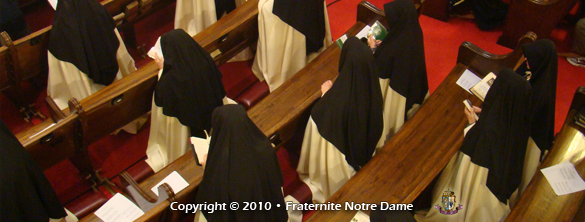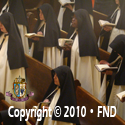
We, Friars and Nuns, Servants of Our Lady are first of all men and women of prayer, for it is in prayer that we draw all the strength necessary to worthily perform the duty of our state.
In accordance with the Church's desires, the Friars and Nuns, Servants of Our Lady recite the Divine Office four times a day: Lauds, Sext, Vespers and Compline. Each day, the Congregation of the Friars and Nuns, Servants of Our Lady carry out the Divine Office: Lauds as morning prayer, and Vespers as evening prayer.
These are the two poles of the Office, main "hours" celebrated accordingly...
One single little hour constitutes, at midday, the noon Office: Sext.
Compline is recited as the Community's evening prayer.
After the Holy Sacrifice of the Mass, we estimate nothing as being above Divine Office, and consider it as the noblest and most useful employment of the day. After having surrendered everything for God, our first concern must be attending to God. We are aware that the zeal we put into the divine service sets the measure for our faithfulness to our vocation.
By performing Divine Office, the Church praises the Lord unceasingly and intercedes for the salvation of the whole world. When we accomplish some parts of the Office, we fulfill the public prayer of the Church.

Regarding Divine Office, the Friars and Nuns, Servants of Our Lady use all the forms of psalmody and chant which are proper, taking into consideration which office is celebrated and what kind of psalm (either in Latin or in the vernacular language), always in keeping with the tradition of the Church, banning all modernism.
Psalmody is sharing, assuring one's responsibilities, communicating fraternally; that is why, before starting the psalmody, we place ourselves in a state of contemplative prayer.
Prayer is not a matter of time and place. One can pray anywhere, in the street, at work etc... We can pray continually, may our hands be free or busy, may we be healthy or sick. We pray through our entire life, through all our actions. Intense moments of personal and community prayer are necessary in the day of the religious. Prayer is the vital center of the Congregation of the Friars and Nuns, Servants and Handmaids of Our Lady.
As for contemplative prayer, we usually fulfill it after the Divine Office - a minimum of 30 minutes per day - Contemplative prayer is the expression of our filial intimacy with God. For us, praying is speaking to God as to a father, a father who is present and who listens, welcoming, and answers because He loves.
Contemplative prayer is time for personal prayer, the moment for a heart to heart, as spontaneous as possible, when the Religious speak to God in the language of love. That is why, practicing contemplative prayer also means keeping silent in presence of the Lord, contemplating Him, letting Him speak, listening to Him, offering oneself to Him, adhering to Him and discovering Him in our work, within ourselves and in the world.
It is through Our Lady that we learn how to practice contemplative prayer; She who, for entire watches, in the intimacy of the house in Nazareth, would hear Jesus speak like the most eminent of masters. She who listened, understood and performed, as the most excellent of disciples, and who "would keep everything in her heart". Each Friday, our contemplative prayer will be dedicated to meditating on the Sorrowful Passion of our Lord and Compassion of Our Lady.

Times of joy or dryness in contemplative prayer are of little avail. What is essential is to accomplish what God expects from us. Saint Teresa of Avila says this on the subject:
"Whomever starts in contemplative prayer, - never forget that, for it is very important- must have the only pretension to toil, determine and dispose himself as diligently as possible to conform his will to God's."
Therefore, just one aim: God's Will. And Saint Teresa would add:
"In contemplative prayer, it is not a matter of thinking much, but loving much".
Saint Teresa of Avila declares that:
"Mental, contemplative prayer is nothing else than a commerce of friendship,
when we converse often and intimately with He, of whom we know that He loves us".
 "You have to pray always, without ever losing courage".
"You have to pray always, without ever losing courage".
Saint Luke 18:1